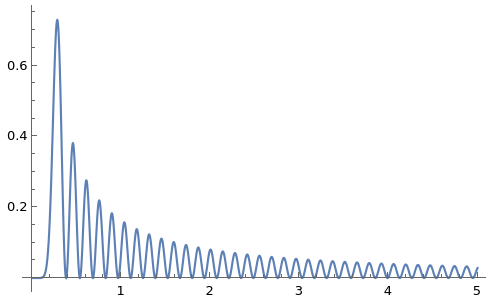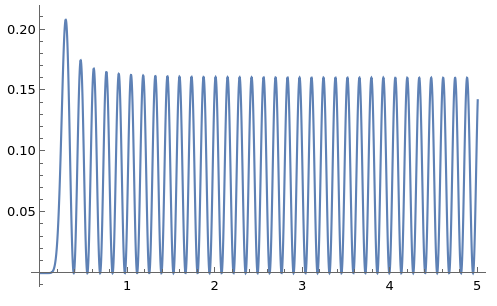Step 1. The expression provided by OP can be cleaned up a bit. For example, this is a subexpression of the expression provided by OP, with the exception that I put an Inactive in to get Mathematica to exploit the fact that there is derivative D just outside:
D[ρ*(((155*2)/ρ)*Inactive[Integrate][BesselJ[l,23*y]^2*y,{y,0,ρ}]),ρ]
This simplifies to
310*ρ*BesselJ[l,23*ρ]^2
Step 2. Doing Step 1 for the entire integrand that OP has provided, I get the following simpler formula for the integrand, where I also replaced 41.85 by 4185/100 to avoid problems with floating point numbers:
integrand[l_]:=integrand[l]=Assuming[ρ>0, 4185/100 l BesselJ[l, 23 ρ]^2 (
ρ^2 Integrate[BesselJ[l, 23 y]^2/y, {y, ρ, \[Infinity]}]
+ Integrate[y BesselJ[l, 23 y]^2, {y, 0, ρ}])/ρ//Simplify];
This can be evaluated. For example, taking the value l==5 in the question:
integrand[5]
(* (1/(1566219705620 ρ^7))837 (529 ρ^2 (-4608 +
101568 ρ^2 - 5596820 ρ^4 +
740179445 ρ^6) BesselJ[0, 23 ρ]^2 -
23 ρ (-18432 + 1625088 ρ^2 - 22387280 ρ^4 +
740179445 ρ^6) BesselJ[0, 23 ρ] BesselJ[1,
23 ρ] + (-18432 + 2843904 ρ^2 - 102981488 ρ^4 -
2960717780 ρ^6 + 391554926405 ρ^8) BesselJ[1,
23 ρ]^2) BesselJ[5, 23 ρ]^2 *)
Step 3. Let us plot this:
Plot[integrand[5],{ρ,0,5},PlotRange->All]
This gives

Looks nice, but decay seems slow. In fact, let us also plot ρ times the integrand:
Plot[integrand[5]*ρ,{ρ,0,5},PlotRange->All]
This gives

It seems likely that this oscillates forever with some fixed amplitude (see remark below). Thus integrand[5] is 1/ρ times this oscillation. That is too slow for convergence of the integral over {ρ,0,\[Infinity]}. Hence the integral does in fact not converge, it is $+\infty$.
The divergence is not due to the behavior near ρ==0, in fact the integrand decays quickly towards ρ==0. Rather, the divergence is due to slow decay as ρ goes to infinity.
Remark. The 1/ρ decay is due to the following terms in integrand[5]//Expand:
ρ BesselJ[0, 23 ρ]^2 BesselJ[5, 23 ρ]^2
ρ BesselJ[1, 23 ρ]^2 BesselJ[5, 23 ρ]^2



InputForm(orRaw InputForm) $\endgroup$